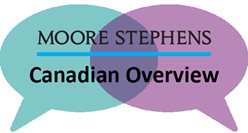 This article is from the quarterly Canadian Overview, a newsletter produced by the Canadian member firms of Moore Stephens North America. These articles are meant to pursue our mission of being the best partner in your success by keeping you aware of the latest business news.
This article is from the quarterly Canadian Overview, a newsletter produced by the Canadian member firms of Moore Stephens North America. These articles are meant to pursue our mission of being the best partner in your success by keeping you aware of the latest business news.
The Internet Age has revolutionized every industry and accounting is no exception. Introducing, cloud accounting; a faster and more efficient method of tracking your business’ expenses and financial reporting.
Cloud accounting is the process of migrating financial accounting systems into a cloud-based platform, away from a server. In terms of the accessibility and benefits to your business, this means having access to your accounting data- accounts payable and receivable, expense account, etc.- from anywhere and at any time. All you need is Internet access and you can simply log in to access all your financial reporting documents with the same ease of logging into Facebook.
The benefits of moving into cloud-based accounting are numerous and the demand for it is growing, particularly among small to mid-size companies. It simplifies account software and maintenance meaning business owners/managers will no longer need to look after hardware and software upgrade. It also eliminates the concern that clients won’t be able to access their documents because of an error on your end. It also offers efficient means of business management by enabling users to upload documents as easily and simply as taking a photo of an invoice and uploading it to the cloud.
Many features of cloud accounting are also automated, such as paying invoices, accepting payments, and grouping expenses. The addition of artificial intelligence can also automate regular business tasks by gauging your usage habits and tailoring the program in ways that best suit you and/or your business’ individual needs. Tools can be added to your cloud accounting solution, giving you a real-time view of all transactions appearing on your bank and credit card statements. By creating rules, the tool can automatically post transactions it recognizes.
By centralizing your reports, documents and expenses, this also makes the process much more collaborative, efficient and streamlined for accountants, CFOs and bookkeepers.
Understandably, some business owners and managers are apprehensive to switch to cloud accounting out of concern for security. However, rest assured these cloud solutions have security on par with that of online banking. Major companies, including Microsoft, are developing software for cloud-based accounting. Not only do they have endless resources to develop top-notch and secure software but, also, it’s important to remember that trusted names in technology will not risk their reputation on anything at risk of being hacked. The bigger risk is that users have their passwords stolen, however this is an easily avoidable risk that can be reduced by creating strong passwords that utilize numbers, a mix of uppercase and lowercase letters, and symbols.
If you are interested in further exploring cloud-based accounting, the next step is to look into companies and software that offer the tools best suited to your business. QuickBooks has been a long-standing favourite of smaller companies and can be expected to add more features to their cloud-based solutions over the next few years. Xero and Wave are two other software companies that specialize in cloud accounting software. Net Suites has been offering cloud-based solutions since 1999 and, as previously mentioned, Microsoft is rolling out new cloud solutions for accounting.
Ultimately, cloud accounting holds a promising future of the modernization and improved efficiency of accounting. It has the potential to be a top tool for both accountants and business owners alike and its value to business operations should to be embraced.
Contributed by
Giles Osborne, CPA,CA from
Segal LLP and
Alain St-Laurent from
Demers Beaulne. This piece was produced as a part of the quarterly Canadian Overview, a newsletter produced by the Canadian member firms of Moore Stephens North America.